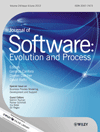
Journal of Software-Evolution and Process
Scope & Guideline
Shaping the Future of Software Methodologies
Introduction
Aims and Scopes
- Software Evolution and Maintenance:
Research on the processes and techniques that facilitate the evolution and maintenance of software systems, including refactoring, technical debt management, and change impact analysis. - Software Process Improvement:
Studies aimed at enhancing software development processes through various methodologies such as Agile, DevOps, and empirical assessments of best practices. - Software Quality Assurance:
Investigations into quality assurance methods and metrics, including defect prediction, testing strategies, and automated testing frameworks. - Emerging Technologies in Software Engineering:
Exploration of the implications of new technologies like AI, blockchain, and cloud computing on software development practices and methodologies. - Human Factors in Software Development:
Research that examines the impact of human behavior, team dynamics, and organizational culture on software development effectiveness. - Security and Compliance in Software Development:
Focus on security challenges in software engineering, including vulnerability assessments, secure coding practices, and compliance with industry regulations.
Trending and Emerging
- Artificial Intelligence in Software Development:
A significant increase in research exploring the use of AI techniques for code generation, defect prediction, and automated testing, indicating a trend towards integrating intelligent systems in software engineering. - DevOps and Continuous Integration/Continuous Deployment (CI/CD):
Growing emphasis on methodologies and practices that support DevOps, including automation of testing and deployment processes to enhance software delivery efficiency. - Blockchain and Smart Contracts:
Emerging research on blockchain technology and smart contracts, focusing on their security implications and development processes, as they gain traction in various industries. - Cybersecurity in Software Engineering:
A rising trend in addressing security challenges within software development processes, with a focus on vulnerability detection and secure coding practices. - Human-Centric Software Engineering:
Increased attention on the human aspects of software development, including team dynamics, user experience, and the impact of organizational culture on software projects.
Declining or Waning
- Traditional Waterfall Methodologies:
There is a noticeable decline in publications focused on traditional waterfall methodologies as the industry increasingly adopts Agile and DevOps practices. - Manual Testing Practices:
Research on manual testing techniques has decreased, with a shift towards automated testing solutions that leverage AI and machine learning. - Legacy System Management:
Interest in legacy systems and their management is waning, likely due to the industry's focus on modernizing applications and adopting cloud-based solutions. - Single-Discipline Software Engineering:
Publications that focus solely on specific disciplines within software engineering (e.g., programming languages) are less frequent, as interdisciplinary approaches become more prevalent. - Static Analysis Tools:
There has been a reduction in research dedicated specifically to static analysis tools, as dynamic and hybrid analysis methods gain popularity.
Similar Journals

PROGRAMMING AND COMPUTER SOFTWARE
Fostering a Deeper Understanding of Software ComplexitiesPROGRAMMING AND COMPUTER SOFTWARE is a distinguished journal committed to advancing the field of software development and programming methodologies. Published by PLEIADES PUBLISHING INC, this journal has been a valuable resource since its inception in 1978, reaching out to researchers, professionals, and students alike. With an emphasis on rigorous peer-reviewed articles, the journal holds a Q3 ranking in the realm of Software according to the latest 2023 Category Quartiles. Though it does not offer open access, the journal ensures that high-quality research is disseminated to its audience, providing insights into evolving programming techniques, software engineering challenges, and innovative solutions. With its convergence of years extending to 2024, PROGRAMMING AND COMPUTER SOFTWARE remains a pivotal publication, fostering a deeper understanding of the complexities in computer programming while supporting the broader software community.

SoftwareX
Championing Cutting-Edge Methodologies in SoftwareSoftwareX is an innovative open-access journal published by Elsevier that has been championing advancements in the fields of Computer Science and Software since its inception in 2015. With a focus on presenting high-quality research, SoftwareX aims to foster collaboration and knowledge exchange among researchers and practitioners, advancing the way software and tools are developed and disseminated within the community. This journal operates under a flexible access model, allowing broad visibility and accessibility to its diverse readership. Positioned in the Q2 and Q3 quartiles of the Scopus ranking system within the domains of Computer Science Applications and Software respectively, SoftwareX stands as an influential platform for sharing cutting-edge methodologies and innovations. The journal's aim is not only to serve as a repository of knowledge but also to embolden practitioners and scholars alike to engage with and implement findings that can accelerate progress within the realms of software engineering and application. Situated in Amsterdam, Netherlands, SoftwareX has embraced an international reach, welcoming submissions that address complex challenges through novel software solutions.

Journal of Computer Languages
Pioneering Research in Human-Computer InteractionJournal of Computer Languages, published by ELSEVIER SCI LTD in the United Kingdom, serves as a crucial platform for advancing research and discussion in the fields of computer networks, human-computer interaction, and software development. With an ISSN of 2590-1184 and E-ISSN 2665-9182, this journal has established itself as a prominent resource within its category, achieving Q3 rankings in 2023 across its respective domains. As part of Scopus' indexed journals, it stands at impressive ranks of #152/395 in Computer Networks and Communications, #172/407 in Software, and #76/145 in Human-Computer Interaction, reflecting its relevance and contribution to the scholarly community. Operating under an open access model, the journal emphasizes accessibility and collaboration among researchers, professionals, and students keen on exploring innovative applications and advancements in computer languages. With a publication span extending from 2019 to 2024, the year-to-year growth reinforces its commitment to impacting both academia and industry significantly. Engage with cutting-edge research and foster your understanding in computer languages through this essential publication.
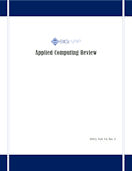
Applied Computing Review
Inspiring Progress in the Computing ProfessionApplied Computing Review is a prominent academic journal published by the Association for Computing Machinery (ACM), an esteemed organization known for advancing the computing profession. Focusing on the intersection of practical applications and theoretical foundations, this journal serves as a vital platform for disseminating research in the field of applied computing, facilitating knowledge sharing among researchers, professionals, and students alike. With an ISSN of 1559-6915, the journal encompasses a wide array of topics including software engineering, data analytics, and application development, addressing current trends and challenges in the industry. Although it does not offer open access, its rigorous peer-review process ensures high-quality publications that significantly contribute to the discipline. Positioned within a competitive landscape, Applied Computing Review is dedicated to fostering innovation and providing insightful perspectives that inspire further research, thereby solidifying its importance in the field of applied computing.

Software Impacts
Empowering Research to Transform Software PracticesSoftware Impacts is an esteemed academic journal published by ELSEVIER, dedicated to advancing the field of software science and informing best practices in development and application. With an ISSN of 2665-9638, this journal facilitates the dissemination of impactful research from 2019 to 2024, making it a valuable resource for both established researchers and promising students alike. Although it currently holds a Q3 ranking in the category of Software and ranks at #270/407 in Scopus, it continues to contribute significantly to the discourse surrounding software-related innovations and methodologies. The journal’s open access policy enhances accessibility and encourages a broader readership, fostering an environment where critical discussions flourish. By addressing the ongoing challenges and advancements in software technology, Software Impacts plays a crucial role in shaping the future of software development and its applications globally.
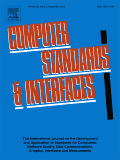
COMPUTER STANDARDS & INTERFACES
Exploring Innovations in Computer Standards and Interfaces.COMPUTER STANDARDS & INTERFACES is a prestigious journal published by Elsevier, dedicated to the intersection of technology, law, and standards in computing. With an impressive impact factor and categorized in the Q1 quartile across several relevant fields, including Computer Science Applications, Hardware and Architecture, and Software, this journal has established itself as a critical resource for researchers and professionals alike. Covering a comprehensive range of topics over its converged years from 1986 to 2025, it provides rigorous peer-reviewed articles and vital insights into the evolving landscape of computer standards. The journal's Scopus rankings affirm its significance with top percentiles in multiple categories, including a remarkable 12th rank in Social Sciences and Law. COMPUTER STANDARDS & INTERFACES welcomes contributions that push the boundaries of knowledge and foster discussions on best practices and innovations, making it an invaluable platform for students and seasoned researchers passionate about advancing the field.
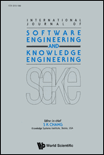
INTERNATIONAL JOURNAL OF SOFTWARE ENGINEERING AND KNOWLEDGE ENGINEERING
Empowering Engineering Minds with Cutting-edge InsightsThe INTERNATIONAL JOURNAL OF SOFTWARE ENGINEERING AND KNOWLEDGE ENGINEERING, published by WORLD SCIENTIFIC PUBL CO PTE LTD in Singapore, is a pivotal platform for disseminating cutting-edge research in the fields of software engineering and knowledge systems. With an ISSN of 0218-1940 and an E-ISSN of 1793-6403, this journal has been a reliable resource for scholars and practitioners since its inception in 1996. The journal is indexed across multiple prestigious databases, reflecting its relevance with a Category Quartile ranking of Q3 in both Computer Graphics and Computer Networks for 2023, and it maintains a steady trajectory of growth and scholarly contribution. Although not an Open Access journal, it is accessible through various academic institutions and libraries, ensuring researchers can engage with high-quality, peer-reviewed articles that explore advancements, theoretical developments, and practical applications in software and knowledge engineering. As it converges towards its end year of 2024, this journal continues to foster innovation and knowledge exchange, making it an essential resource for anyone invested in these dynamic fields.
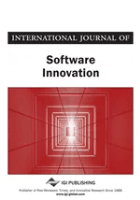
International Journal of Software Innovation
Innovating the Future of Computer Science, One Article at a Time.The International Journal of Software Innovation, published by IGI Global, serves as a crucial platform for disseminating cutting-edge research in the field of software engineering and innovation. With its ISSN 2166-7160 and E-ISSN 2166-7179, this journal has a broad scope that encompasses multiple areas of computer science, including Artificial Intelligence, Computer Graphics and Computer-Aided Design, Computer Networks and Communications, Software, and Computer Science Applications. Since its inception in 2017 and continuing until 2024, the journal has established itself in Q4 quartiles across various categories, reflecting both emerging trends and foundational principles in software innovation. Although it does not currently follow an Open Access model, its findings are vital for researchers, professionals, and students aiming to understand and contribute to the evolving landscape of software technologies. Located in the United States at 701 E Chocolate Ave, Ste 200, Hershey, PA 17033-1240, this journal not only offers research insight but also encourages collaboration and knowledge sharing among scholars worldwide.

Journal of Object Technology
Fostering Dialogue in Object-Oriented ResearchJournal of Object Technology is a premier publication housed under the esteemed JOURNAL OBJECT TECHNOLOGY in Switzerland, dedicated to advancing the field of software engineering and technology. With a history of continuous publication since 2002, this journal serves as a platform for innovative research, critical reviews, and case studies that explore the nuances of object-oriented technologies and their applications in software development. Although currently categorized in the lower quartile (Q4), this journal's focus on relevant and emerging topics remains vital for researchers, professionals, and students alike, seeking to enhance their understanding of contemporary software-related issues. Addressing significant milestones and offering insights into future directions, the Journal of Object Technology plays an essential role in the evolving landscape of computer science, providing open access opportunities that ensure wide dissemination of knowledge. Situated at ETH Zurich, the journal is committed to fostering collaboration and dialogue among researchers worldwide, underscoring its importance within the global scholarly community.
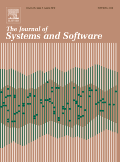
JOURNAL OF SYSTEMS AND SOFTWARE
Pioneering Innovations in Information Systems.JOURNAL OF SYSTEMS AND SOFTWARE, published by Elsevier Science Inc, is a premier academic journal that serves as a vital platform for the dissemination of cutting-edge research in the fields of software engineering, information systems, and hardware architecture. With an impressive impact factor and consistently ranking in the Q1 category across several relevant sectors, including hardware and architecture (ranked 33rd out of 177), information systems (ranked 72nd out of 394), and software (ranked 75th out of 407) as of 2023, this journal is recognized for its rigorous peer-review process and high-quality publications. Established in 1979, the journal has become an essential resource for researchers, professionals, and students looking to stay abreast of the latest advancements and emerging trends in systems and software. While the journal does not currently operate under an open-access model, it ensures wide visibility through its indexed publications and is dedicated to advancing scholarly discourse in computer science. With contributions from leading experts in the field, JOURNAL OF SYSTEMS AND SOFTWARE continues to shape the landscape of software and systems research.